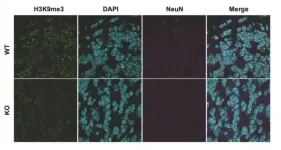SUV39H2: A direct genetic link to autism spectrum disorders
2021-07-16
(Press-News.org) New research from the RIKEN Center for Brain Science (CBS) in Japan shows that a deficit in histone methylation could lead to the development of autism spectrum disorders (ASD). A human variant of the SUV39H2 gene led researchers to examine its absence in mice. Published in Molecular Psychiatry, the study found that when absent, adult mice exhibited cognitive inflexibility similar to what occurs in autism, and embryonic mice showed misregulated expression of genes related to brain development. These findings represent the first direct link between the SUV39H2 gene and ASD.
Genes are turned on and off throughout our development. But genetic variation means that what is turned off in some people remains turned on in others. This is why, for example, some adults can digest dairy products and others are lactose intolerant; the gene for making the enzyme lactase is turned off when some people become adults, but not others. One way that genes can be turned on and off is through a process called histone methylation in which special enzymes transfer methyl groups to histone proteins that are wrapped around DNA.
Variations in genes related to methylation during brain development can lead to serious problems. One such variation occurs in a rare disorder called Kleefstra Syndrome, in which a mutation prevents methylation of H3K9--a specific location on histone H3. Because Kleefstra Syndrome resembles autism in some ways, RIKEN CBS researchers led by Takeo Yoshikawa looked for autism-specific variations in genes that can modify H3K9. Among nine such genes, they found one variant in an H3K9 methyltransferase gene--SUV39H2--that was present in autism, and the mutated SUV39H2 prevented methylation when tested in the lab. Similar loss-of-function results were found for the mouse version of the variant.
The next step was to see what happens in mice that lack the Suv39h2 gene. Behaviorally, the researchers found that the mice could learn a simple cognitive task, but had difficultly when the task required cognitive flexibility. In the simple task, mice learned to get a reward by poking a door at alternating diagonal corners of a cage. After they could do this well, the possible reward locations switched to the other two diagonal corners. The genetically modified mice did this as well as wild-type mice. In another task, after learning to alternate between the two diagonal corners, only the location of one reward was switched. When the mice were challenged to alternate randomly between these two tasks, wild-type mice could adapt quickly, but the Suv39h2-deficient mice took much longer. "This serial reversal-learning task was essential," says first author Shabeesh Balan. "Cognitive inflexibility is a core symptom of ASD, and our new task was able to address this behavioral feature in ways that previous mouse studies could not."
When the researchers examined what happened in the mouse brain when H3K9 methylation failed to occur, they found that important genes that are usually silenced in early development were turned on in the experimental mice. "Suv39h2 is known to be expressed in early neurodevelopment and to methylate H3K9," explains Yoshikawa. "This keeps a check on genes that should be switched-off. But without it, genes in the protocadherin β cluster were abnormally expressed at high levels in embryonic mice." Because protocadherins are critical for the formation of neural circuits, the researchers believe they have found an important biological pathway that could be central to several neurodevelopmental disorders.
The team then verified the importance of SUV39H2 in human ASD by finding that its expression was lower in the postmortem brains of people with ASD than of controls. "What began with a loss-of-function mutation in only one person with ASD," says Yoshikawa, "has led to a general causal landscape for ASD that culminates in brain circuit abnormality."
Protocadherins have already been proposed to be related to a broad range of mental disorders. This study shows that activating the SUV39H2 gene is a potential therapy for mental disorders--including ASD--that should be investigated more thoroughly in future studies.
INFORMATION:
Reference: Balan et al. (2021) A loss of function variant in SUV39H2 identified in autism spectrum disorder causes altered H3K9-trimethylation and dysregulation of protocadherin β cluster genes in the developing brain. Molecular Psychiatry. doi: 10.1038/s41380-021-01199-7
[Attachments] See images for this press release:

ELSE PRESS RELEASES FROM THIS DATE:
2021-07-16
What The Study Did: The association between primary care payment models and the use of telemedicine for Medicare Advantage enrollees during the COVID-19 pandemic was examined in this study.
Authors: Brian W. Powers, M.D., M.B.A., of Humana Inc. in Louisville, Kentucky, is the corresponding author.
To access the embargoed study: Visit our For The Media website at this link https://media.jamanetwork.com/
(doi:10.1001/jamahealthforum.2021.1597)
Editor's Note: The article includes conflicts of interest disclosures. Please see the article for additional information, including other authors, author ...
2021-07-16
What The Study Did: Researchers investigated whether death, other hospital outcomes and processes of care differed between patients cared for by female and male physicians at hospitals in Canada.
Authors: Fahad Razak, M.D., M.Sc., of the University of Toronto in Ontario, Canada, is the corresponding author.
To access the embargoed study: Visit our For The Media website at this link https://media.jamanetwork.com/
(doi:10.1001/jamahealthforum.2021.1615)
Editor's Note: The article includes conflicts of interest disclosures. Please see the article for additional information, including other authors, author contributions and affiliations, conflict of interest and financial disclosures, and funding and support.
# # #
Media advisory: The full study is linked to this news ...
2021-07-16
What The Study Did: National health care systems have different capacities to correctly identify people who died of COVID-19. Researchers in this study analyzed the gap between excess mortality and COVID-19 confirmed mortality in 67 countries to determine the extent to which official data on COVID-19 deaths might be considered reliable.
Authors: Davide Golinelli, M.D., Alma Mater Studiorum-University of Bologna in Italy, is the corresponding author.
To access the embargoed study: Visit our For The Media website at this link https://media.jamanetwork.com/
(doi:10.1001/jamanetworkopen.2021.17359)
Editor's ...
2021-07-16
Messenger RNA vaccines against COVID-19 were not detected in human milk, according to a small study by UC San Francisco, providing early evidence that the vaccine mRNA is not transferred to the infant.
The study, which analyzed the breast milk of seven women after they received the mRNA vaccines and found no trace of the vaccine, offers the first direct data of vaccine safety during breastfeeding and could allay concerns among those who have declined vaccination or discontinued breastfeeding due to concern that vaccination might alter human milk. The paper appears in JAMA Pediatrics.
Research has demonstrated that vaccines with mRNA inhibit transmission ...
2021-07-16
Although the risk of a child being admitted to hospital due to COVID-19 is small, a new UK study has found that around 1 in 20 of children hospitalised with COVID-19 develop brain or nerve complications linked to the viral infection.
The research, published in The Lancet Child and Adolescent Health and led by the University of Liverpool, identifies a wide spectrum of neurological complications in children and suggests they may be more common than in adults admitted with COVID-19.
While neurological problems have been reported in children with the newly described post-COVID condition paediatric inflammatory multisystem syndrome temporally ...
2021-07-16
A scientific review has found evidence that a disruption in blood clotting and the first line immune system could be contributing factors in the development of psychosis.
The article, a joint collaborative effort by researchers at RCSI University of Medicine and Health Sciences, Cardiff University and the UCD Conway Institute, is published in Molecular Psychiatry.
Recent studies have identified blood proteins involved in the innate immune system and blood clotting networks as key players implicated in psychosis.
The researchers analysed these studies and developed a new theory that proposes the imbalance of both of these systems leads to inflammation, which in turn contributes to the development of psychosis.
The work proposes that alterations ...
2021-07-16
Tokyo, Japan - Primary immunodeficiencies, such as severe combined immunodeficiency disease (SCID), occur when the immune system does not work properly, leading to increased susceptibility to various infections, autoimmunity, and cancers. Most of these are inherited and have an underlying genetic causes. A team at TMDU has identified a novel disorder resulting from a mutation in a protein called AIOLOS, which functions through a previously unknown pathogenic mechanism called heterodimeric interference.
The gene family known as IKAROS zinc finger proteins (IKZFs) is associated with the development of lymphocyte, a type of white blood cell involved ...
2021-07-16
URBANA, Ill. - U.S. corn and soybean varieties have become increasingly heat and drought resistant as agricultural production adapts to a changing climate. But the focus on developing crops for extreme conditions has negatively affected performance under normal weather patterns, a University of Illinois study shows.
"Since the 1950s, advances in breeding and management practices have made corn and soybean more resilient to extreme heat and drought. However, there is a cost for it. Crop productivity with respect to the normal temperature and precipitation is getting lower," says Chengzheng Yu, doctoral student in the Department ...
2021-07-16
New research led by the University of Cambridge suggests that autism can be detected at 18-30 months using the Quantitative Checklist for Autism in Toddlers (Q-CHAT), but it is not possible to identify every child at a young age who will later be diagnosed as autistic. The results are published today in The BMJ Paediatrics Open.
The team at the Autism Research Centre in Cambridge conducted a prospective population screening study of nearly 4,000 toddlers using a parent-report instrument they developed, called the Quantitative Checklist for Autism in Toddlers (Q-CHAT). Toddlers were screened at 18 months and followed up at 4 years.
The ...
2021-07-16
Northwestern University engineers have developed the first full, three-dimensional (3D), dynamic simulation of a rat's complete whisker system, offering rare, realistic insight into how rats obtain tactile information.
Called WHISKiT, the new model incorporates 60 individual whiskers, which are each anatomically, spatially and geometrically correct. The technology could help researchers predict how whiskers activate different sensory cells to influence which signals are sent to the brain as well as provide new insights into the mysterious nature of human touch.
The research was published last week in the Proceedings ...
LAST 30 PRESS RELEASES:
[Press-News.org] SUV39H2: A direct genetic link to autism spectrum disorders


